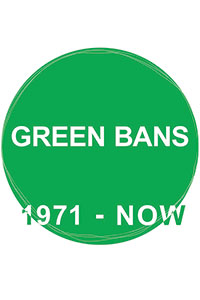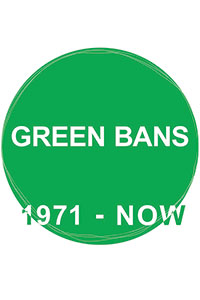Fowler-Ware Industries – Merrylands
In 1973 Holroyd Council gave approval to Fowler Ware Industries to convert 6 acres of bushland in West Merrylands into a factory for the manufacture of toilet bowls and other china bathroom fittings. Following the initial excavation, residents believed land was being converted into a park or swimming pool but when the true nature of the project became known a resident action group was formed. After various demonstrations, petitions and appeals at council meetings failed, they turned to the BLF in August who swiftly responded by withdrawing all workers from the Merrylands construction site. Residents were strongly opposed to the construction of any more industrial sites in their developing residential area and argued for the bushland to remain as it is or to be turned into a park.
The BLF and the Merrylands resident action group pointed towards the Mudgee-Gulgong area as a site for Fowler Industry’s factory; it made sense given that this was where the clays used to produce their china were extracted. The resident action group in Mudgee joined the fight, bringing the project to the attention of the Mudgee Municipal Council who agreed that strong efforts should be made to gain the $5 million industry. By October they had announced their interest, offering Fowler a range of inducements (e.g. cheap land, water, sealed roads, electricity, and housing) to transfer the factory to the area. The company ultimately decided that Merrylands was not the right place for their factory.
References
Verity and Meredith Burgmann, Green bans, red union: the saving of a city, 1998; Anne Summers (et al.), The little green book: facts on the green bans, 1973.
Research provided by Isabella Maher

